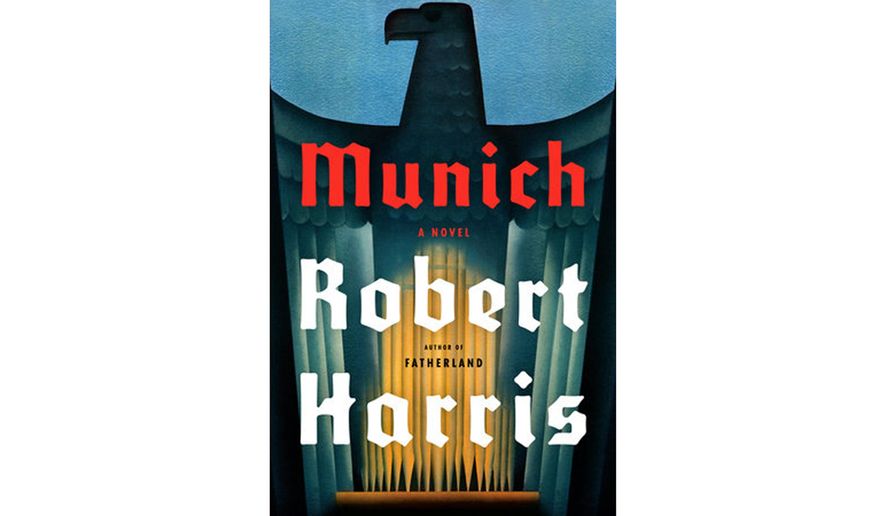OPINION:
MUNICH
By Robert Harris
Alfred A. Knopf, $27.95, 320 pages
“Munich,” Robert Harris’ latest novel, describes the cobbling together of the 1938 Munich Agreement, by which Britain and France let Germany take over the Sudatenland region of Czechoslovakia in return for assurances of peace.
Without this agreement World War would have broken out there and then because Hitler would have just marched into Czechoslovakia to take what he wanted, and Britain and France would have declared war. They did so a year later, after Hitler attacked Poland — those Munich avowals of peace notwithstanding.
So, was the Munich Agreement and its companion resolutions opposing war worth the paper they were written on? Or was it, as its detractors have always claimed, a self-evidently useless and shameful exercise in appeasement?
Robert Harris’ sympathetic description of Neville Chamberlain, the British prime minister who negotiated it, not only emphasizes that the agreement bought was vital because it gave Britain time to rearm, but also that Chamberlain was not the weak or misguided leader so often portrayed, but a shrewd operator: the equal of Hitler in his stubborn determination to get his own way.
Chamberlain shared the belief of his parliamentary colleague Winston Churchill that “To jaw-jaw is better than to war-war.” But though jaw-jaw beats everything in world politics, it offers few advantages in fiction because it is unglamorous, indeed tedious if not complemented by a knotty plot or the careful unraveling of character and motive.
With the exception of the nuanced characterization of Chamberlain, both are largely lacking in “Munich” — perhaps inevitably so given that the history of the agreement and those involved in its drafting have been widely explored.
Robert Harris’ research into the negotiations that produced the document is thorough, and his great strength is the lucid exposition of the details of its forging. Hitler’s demand for the Sudatenland, which had become Czechoslovakian at the end of World War I, was not entirely unreasonable since its population was German — hence Chamberlain’s willingness to make a deal that could, he hoped, avert war.
The author not only details Chamberlain’s thinking, but also Hitler’s attitude to him (he detested him), the arrangements inside the Fuhrerbau where the meetings took place, and even the details of the travel and accommodation for the advisors and diplomats.
Among them is Hugh Legat, a young star of the diplomatic corps. As a translator he is in on some historic events, though as a junior he is also often left sorting nitty-gritty logistics. This gives him time to reconnect with Paul von Hartmann, a German friend from their Oxford days. Paul, too, is a translator. He has access to Hitler and a serious desire to assassinate him.
In 1932 Hugh, Paul and Paul’s girlfriend Leyna had spent a vacation together in Germany. Memories of the country back then occasionally provide a contrast to the situation pertaining in 1938. More importantly towards the end of the novel, Paul contrives for Hugh to re-meet Leyna. This vignette explains the intensity of Paul’s opposition to Nazism, but it comes belatedly and seems almost irrelevant at this point, since there is so much in the novel, and, of course, in the history of the period, to justify Paul’s attitude to Hitler and National Socialism.
So Leyna — who intrigues because her name is trailed throughout the novel — is never more than briefly evoked, and her relationship with Paul never becomes substantial.
Neither does Hugh’s relationship with his wife Pamela. The gripping first chapter opens with Hugh waiting for her in the dining room of the Ritz for an anniversary luncheon. She has been getting gas masks for their children. Outside trenches are being dug. Before they can eat Hugh is called back to the Foreign Office as the threat of a German invasion of Czechoslovakia looms.
The febrile atmosphere of London is almost palpable. Pamela is a vivid bright spot. A reader could assume she will be a significant character. But she more or less disappears from the novel. Legat knows her to be unfaithful and his anxieties are occasionally referenced, but the marriage and her infidelity are never explored. Is this sketch of marital faithlessness intended to echo the faithlessness of Europe’s politicians? If so it lacks resonance because it lacks detail or depth.
This year is the 80th anniversary of the Munich Agreement. Some people may have childhood memories of crowds cheering Chamberlain in Munich or of his tumultuous welcome when he returned to England proclaiming “peace with honor.” But for most of us the events in Munich in 1938 are history. Those with a special interest in this period will appreciate the merits of Robert Harris’ novel: its careful tracing of events, and the exposition of the thinking and motives of some of the German and British participants.
Claire Hopley is a writer and editor in Amherst, Mass.




Please read our comment policy before commenting.